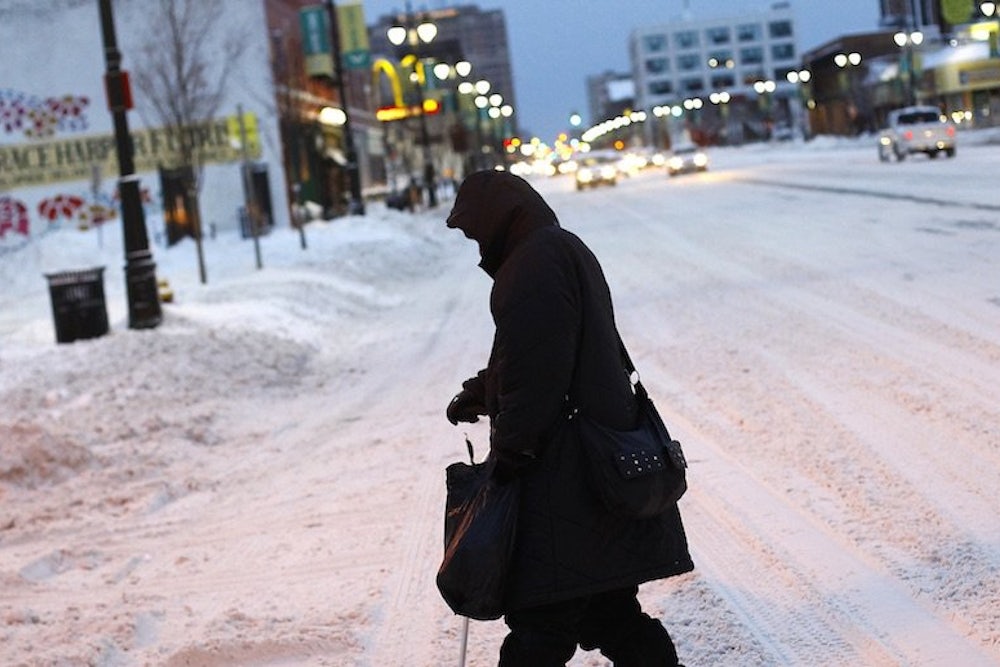Of course James Robertson deserves a car. For the past decade, ever since his 1988 Honda Accord died, the 56-year-old factory worker has been walking 21 miles round-trip from his Detroit home to his job in Rochester Hills—a story few people knew until the Detroit Free Press Sunday profile of him in went viral. Four days later, and a crowd-funding campaign to "Help James Robertson Get a Car" has brought in nearly $300,000 in donations. Robertson's punishing daily slog is over.
But even as we celebrate the end of his patchwork foot-and-bus commute, we must recognize it as being only one extreme instance of some pervasive macro-level social problems. Robertson’s story is also a story of job migration, the failures of public transit, and especially of poverty. His commute highlighted the fact the working poor have commuting expenses twice as high as other workers, and because poverty makes ordinarily things like getting around very, very hard.
Furthermore, the response to Robertson’s story showed a classically American kind of nearsighted problem-solving: reducing every political question to the stories of individuals, and believing that helping those individuals can substitute for addressing systemic causes. Giving Robertson money is a beautiful gesture, but the campaign must be linked to a greater critique of the desiccated public transit infrastructure and low-paying manufacturing work that necessitated his commute. The most important consequence of the attention paid to Robertson so far has been the simple demand being made in the Detroit media for Rochester Hills residents to reconsider their refusal to implement basic bus service, and for a metro-wide rethink (even “revolution”) of the entire transit network.
Our natural empathy for individuals leads to solutions that tend to be feel-good rather than do-good. But to be serious about the situation faced by Robertson and scores of other low-wage workers requires an appreciation that, to achieve a just outcome, charity must be coupled with reform. Or, as Yale chaplain William Sloane Coffin said, “Charity is a matter of personal attributes; justice, a matter of public policy. Charity seeks to alleviate the effects of injustice; justice seeks to eliminate the causes of it.”
Even more pernicious, perhaps, is how Robertson’s boss used the story as a stick with which to beat other workers. “I say, if this man can get here, walking all those miles through snow and rain, well I'll tell you, I have people in Pontiac 10 minutes away and they say they can't get here — bull!” Instead of seeing a 21-mile commute as an outrageous theft of Robertson’s time and health, Robertson’s boss saw it as a model to be aspired to.
Simply elevating Robertson as a folk hero, and lavishing him with support, therefore risks coming to the wrong conclusion. “We could use more men like James Robertson in this world,” wrote donors to the fundraising campaign. But surely if we want more men with Robertson’s fortitude, we also want far fewer to have suffer as he has. What he endured may be inspiring, but it's horrifying too.
Certainly, James Robertson’s story has been a powerful affirmation of public compassion. The internet has an astonishing power to amass and bestow money on people with inspiring stories, and it's heartwarming to see Robertson's terrible burden finally lifted. But there are inherent limits to this kind of charitable response. If we celebrate Robertson’s automotive commute as a victory, then we risk making it harder to get attention for those who suffer only slightly less punishing distances to work each morning. Their stories will not go viral, and their own commutes will continue long after Robertson drives his new car off the lot.
